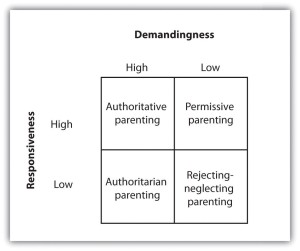
We live in a world of diversity, but even with each family and parent being individual and different there are patterns that we can learn from. Diana Baumrind studied and published some of the most extensive research ever conducted on child-parent relationships and parenting styles. during the course of her studies she narrowed parenting down into four major styles using two principles:
.
They are Demandingness and Responsiveness
.
.

I’d include definitions for these principles but they are almost exactly what they sound like.
Noticing and developing these two principles and studying hundreds of subjects from infancy to adolescence Diana came up with four major parenting styles
.
They are: Authoritarian, Authoritative, Permissive and Disengaged.
here is a simple diagram combining what we’ve introduced so far:
Parents that are generally high in both warm communication and demands when raising their children are considered Authoritative.
Parents Low in both areas we will call Disengaged or Neglecting.
Parents that are high in demands or Responsiveness and low in the other are either Authoritative or Permissive as shown.
Diana Baumrinds research showed that parents who are highly demanding but equally high in responsiveness or Authoritative find the most success in parenting.
Success being defined as helping children develop the ability and desire to make good choices on their own.
Parenting styles that are not demanding enough or that are unresponsive, yield children who are more prone to entitlement, lack of drive, and disobedience.
Using what we learned in the last post about teaching Doctrine and Principles this makes sense.
Parents that communicate with their children, that give positive and negative feedback and are not closed off are labeled as responsive, these parents are generally warm and loving but also stern and understanding when needed.
Parents that have expectations for their children, that have set and explained limits and boundaries and stick to them are labeled as demanding. While to some parents this seems mean or controlling it is best for children to have consistent demands set.
When children understand the demands and know that they will remain constant they are more likely to be obedient. This is in part because of the consistency and the understanding they have of the rules. When parents are inconsistent or make no demands children will feel that rules are unfair or limiting, and they will not desire to act like those who have learned consequences.
Baumrind’s studies concluded that to produce autonomous children we need to be both demanding and responsive.
If we are unresponsive but demanding children will feel imposed upon and often will rebel. We cannot ignore our children, we will kill our relationship.
If we are responsive but not demanding children will become entitled and while they may learn to choose what they want they will may not learn to work for it.
Children are most happy and autonomous when they have grown up with consistent expectations, love and responsiveness from parents.

No comments:
Post a Comment